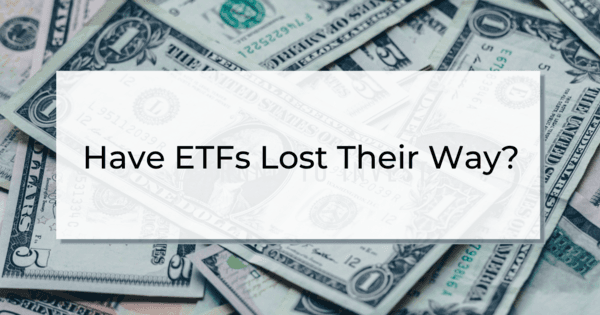Advertisement
OPINIONS
Have ETFs Lost Their Way?
Do we really need so many choices?
When it comes to investing for us retail investors, ETFs are unsurprisingly a popular option, with its relatively low cost and accessibility. However, in recent years, several ETFs have sprung up which makes me wonder if the industry is taking a good thing too far.
Quick Primer
Before I delve further into the topic, let's go over some important definitions.
What is an ETF?
An exchange-traded fund (ETF) is a type of security that involves a basket of securities that often tracks an underlying index. These ETFs are listed on exchanges like the New York Stock Exchange (NYSE) and can be traded throughout the day.
What is a stock index?
A stock index takes a sample of stocks that are deemed representative of an industry, a country, a sector, or an area. They serve as a proxy for the markets it samples.
What YOU need to know
Index = A representative sample of the economy
ETF = A security that usually tries to track this index
Brief History of ETFs
The first ETF that was publicly available to retail investors was actually the S&P500 Trust ETF (SPDR). This was launched in 1993 and it tracks the S&P500 Index.
Soon after, Barclays entered in 1996, and even Vanguard, which was famous for their index funds then, started offering ETFs in 2001.
As of December 2019, it is estimated that there are nearly 7,000 ETFs trading globally, with an AUM of about $5.8T.
It is at this point that I wonder, do we really need so many different ETFs?
The Issue with ETFs
The main issue with ETFs is that it can technically be made up of anything.
If you look at the definitions again, an ETF just needs to contain a basket of securities, and it doesn't need to always track an underlying index. You can have an actively managed ETF trying to beat an index or even an inverse ETF that tries to bet against an index.
Even if an ETF does track an index, you need to consider what constitutes the index. If the index comprises of securities that are heavily overweight in a particular industry, then you are still exposed to the risks that are inherent to that industry.
- Case in point, energy ETFs have not done well this year due to Covid19.
This isn't to say that ETFs are no longer suitable for retail investors like you and me. It's just that given the broad definition of an ETF, some responsibility falls on us to ensure that we know what we are investing in. It is still very much a good low-cost instrument that we can use to grow our wealth.
Key Points to Look Out For
The criteria for choosing an ETF varies depending on different factors. TheInvestQuest has recently updated their Ultimate Stock ETF List for SG Investors, so you can check the article out for more information.
Briefly, you need to consider:
Taxes for SG Investors. This includes dividend withholding tax and possible estate tax.
Costs. This can include the ETF's total expense ratio and other costs such as the commission from trading on a brokerage.
Some other factors to look out for
While it is important to consider the costs and the annual returns the ETF has made, there are other factors that you can also consider in order to make a more informed decision.
Here are two other factors you can consider before you decide on an ETF.
1. Investment Objective
This tells you the underlying goal of the ETF. If it is an index ETF, it will state the index that it is trying to track. If it is an actively managed ETF, it will state the index it is trying to benchmark against. This is important as you need to be comfortable with what the ETF is trying to achieve.
2. Investment Strategies
This tells you how the ETF will meet the objectives. There are actually different strategies the fund can take.
One way would be if the fund tries to own most of the securities in the index, aka physical replication. This is arguably the more intuitive way.
The other would be for the fund to use swaps and derivatives, aka synthetic replication. This is something to be careful of. If it sounds foreign to you, you should probably avoid this.
Let's run through a brief example
Let's use the prospectus for the Vanguard S&P500 ETF (VOO) as an example here.
First, let's take a look at the investment objective.

Okay. So this ETF clearly states that it is tracking an index. Let's take a look at how it does it.

Here, the fund clearly states that it will try to replicate the index by investing in the stocks that make up the index. It doesn't use complicated instruments like swaps and other derivatives.
Conclusion
The inception of ETFs undoubtedly provides us with a relatively low-cost flexible option to choose from when it comes to investing. However, there is such a thing as taking a good thing too far, and given its broad definition, there are probably certain ETFs that would instead be detrimental to investors.
Hence, some of the responsibility also falls on us to know what we are investing in, and since this information is available to the public, we should make use of it.
Resources
https://www.investopedia.com/terms/i/index.asp
https://www.investopedia.com/terms/e/etf.asp
https://www.visualcapitalist.com/the-26-year-history-of-etfs-in-one-infographic/
https://www.etf.com/sections/features-and-news/worst-performing-etfs-year
https://etfdb.com/etf-education/how-to-read-an-etf-prospectus/
https://www.investopedia.com/articles/investing/061614/synthetic-vs-physical-etfs.asp
Comments
2739
10
ABOUT ME
Salaryman
2739
10
Advertisement
No comments yet.
Be the first to share your thoughts!
